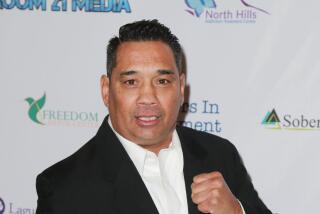Ex-Wife of Serviceman Wins Ruling on Access to Pension : The Military: Appeal court grants divorcee share of retirement pay despite her failure to file for it by the deadline.
- Share via
The ex-wife of a serviceman is entitled to share his military pension even if she misses an apparent legal deadline in asking for it, a state appellate court in San Diego ruled Wednesday.
David J. Berry’s pension is community property, meaning his ex-wife, Sharon, is entitled to share in it, even though she failed to formally ask for her part until five years after they were divorced and she had long missed an apparent filing deadline, the state 4th District Court of Appeal said.
The case was the first in California dealing with a state law--enacted in response to a complex go-around between the U.S. Supreme Court and Congress on the issue of ownership of military pensions--that purportedly cut off ex-spouses’ claims as of 1986. Sharon Berry didn’t file her claim until 1987.
Because she wasn’t even close to making the deadline, the decision suggests that California courts are willing to find any avenue to give ex-spouses, usually women, a share of the pensions, attorneys in the case said.
“You have a situation where a Court of Appeal is not going to find itself in the situation of denying an ex-spouse a military pension,” said Ronald W. Noya, David Berry’s San Diego lawyer. “So they’re going to torture the technical requirements and basically find some way to make the law stretch to fit someone in Sharon’s position.”
Stephen Temko, a San Diego attorney who represented Sharon Berry, said: “In California, the courts are going to try to give the women relief. They earned the pensions just as much as the (husbands) did.”
Noya promised an appeal of the decision to the California Supreme Court.
“I don’t think anyone wants to deny anyone a share of a military pension,” Noya said. “I certainly don’t. But it would be useful if there was some predictability here.”
David Berry entered the Air Force in 1959. He and Sharon were married in 1962.
David retired from the Air Force after 20 years, in 1979. In 1982, the couple obtained a divorce in Arizona, where they both lived at the time.
Sharon is now a retail clerk in Tucson, Temko said. David relocated to San Diego and works in a factory, Noya said.
Their divorce papers did not mention anything about the pension, $732 monthly. In April, 1987, Sharon, seeking financial help, filed a claim seeking her share, which was calculated--taking into account David’s three unmarried years in the service--at 42.7%, or $312. David resisted that claim, saying his pension was his own, separate property.
California traditionally had labeled pensions community property, meaning they were to be split by a husband and wife upon divorce. But, on June 25, 1981, the U.S. Supreme Court said that states could not treat the pensions as community property, meaning the spouse that “earned” the pension got to keep it.
Congress then negated that ruling by enacting a law saying that, as of Feb. 1, 1983, the states could again treat military pensions as community property.
Caught in the middle were those people--like the Berrys--whose divorces were made final between the June 25, 1981, Supreme Court opinion and the Feb. 1, 1983, effective date of the new law. California legislators gave those spouses until Jan. 1, 1986, to file a claim.
The problem with Sharon’s claim, David said, was that she didn’t file until April, 1987, or 16 months late.
After a one-day trial, San Diego Superior Court Judge Thomas Ashworth sided with Sharon, ruling in June, 1988, that she was not barred from filing.
The 4th District agreed, saying that missing the filing deadline, no matter by how long, wasn’t a persuasive reason to deny Sharon her share of the pension, because that law didn’t apply.
Instead, Sharon was entitled to pursue a claim for her share at any time under a separate and long-settled principle, Justice Don R. Work said. That rule has always given a spouse the right to claim a pension share--or any asset omitted from final divorce papers--without regard to any short-term deadline, Work said.
Work also rejected the claim that the pension was David’s own property.
The pension had to be labeled according to the law that was in effect in 1982, when the Berry divorce became final, and that was when the Supreme Court opinion was in effect, Work conceded.
But, since Congress overturned that ruling and made the law retroactive to June 25, 1981, that meant the pension was community property under the traditional California law, Work said.
Justices Howard Wiener and Charles W. Froehlich Jr. concurred in the ruling.
More to Read
Inside the business of entertainment
The Wide Shot brings you news, analysis and insights on everything from streaming wars to production — and what it all means for the future.
You may occasionally receive promotional content from the Los Angeles Times.










